
https://www.youtube.com/watch?v=YIowIQFS9rg
AI Research Tools: Consensus
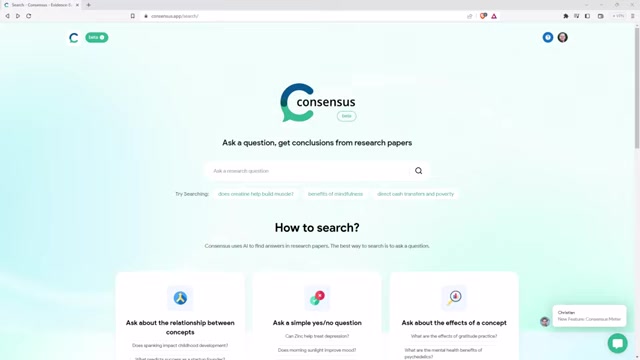
Hi , friends .
Welcome back to the channel .
Seems like every week , we are getting some cool new AI tools .
And this week , the one that I have come across is called Consensus .
Let you ask questions about research and it will search research papers and give you summaries of them .
So one of the big criticisms of ChatGPT has been that sometimes when asked for citations , it will just make up fake research papers .
And there's been a couple of tools like Syspace and Elicit that I've talked about before that try and fill in this gap of actually searching research papers rather than just using the large language models to try and answer questions .
This is a little bit similar where we can ask it a question .
And if we come down , we can see that it's got a few examples .
So asking about the relationship between concepts , asking simple yes no questions , or asking about the effects of a particular thing .
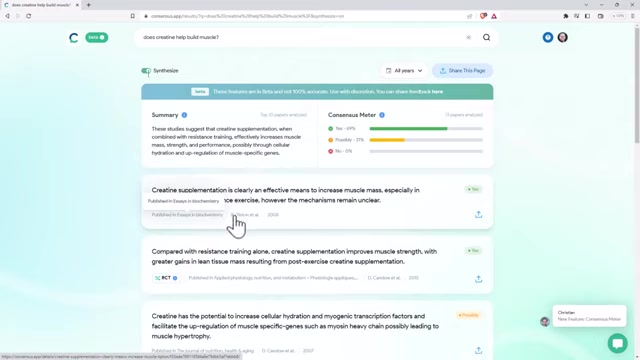
And it will do pretty good jobs of all of these of summarizing research by searching through actual research papers that it will quote and cite and link to where possible .
The thing that I really like is when you ask a yes no question .
So we've got a couple of examples here .
We'll just use one of these .
Does creatine help build muscle ?
So we'll click on that .
And it takes a little while for it to do the searching .
Actually , that was a little bit quicker than usual .
And so here we can see that it has a number of citations .
For each one , it gives the little description of the finding , the journal it was published in , the authors , the date .
If we click on it , then we can actually see the title .
It's one downside that I don't like is it doesn't give you the title without clicking on it but that's that's a pretty minor thing .
It's got a link to the full text .
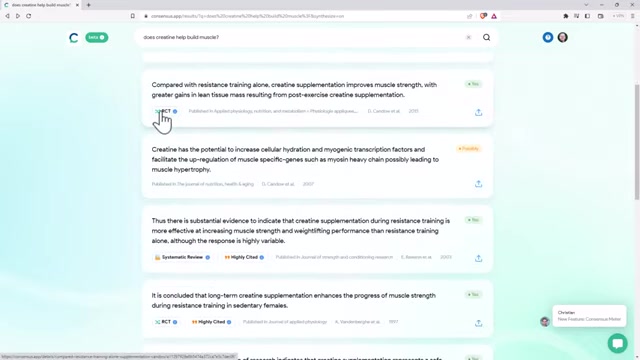
And if we come back to that page , if we scroll down , it also highlights where we've got things like a randomized controlled trial or a systematic review or a paper that's been highly cited .
And so it will favor these .
So these better sources that have been highly cited , that are doing systematic reviews and meta analyses .
Here's another one .
Very rigorous journal .
So it is actually qualifying the quality of its findings .
The other thing that I really like , if we come back up , is it will give a summary and it has this thing called the consensus meter .
So it's gone through .
It's picked out what it thinks of the 13 best papers where there is a clear cut yes , possibly , or no .
And then it just gives us little summary here .
So our question does creatine help build muscle .
And it's saying , well , of those 13 papers , 69% said yes .
31% said possibly .

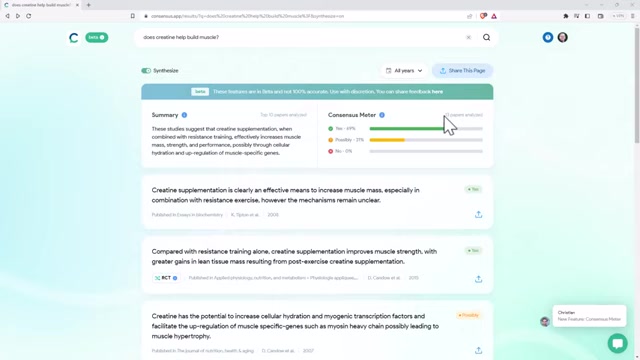
The summary based on what it thought was the top 10 papers .
And these numbers , the top 10 , the top 13 , they seem to change as you ask different questions .
So I think what it has is a threshold of if a piece of evidence is up to a particular standard , and it seems to be a pretty high standard , then it will include it in the consensus meter and it'll conclude in the summary .
If we scroll down , we can see these different articles .
I do hope that they put in the titles .
It's the one thing that it could probably do a little bit better .
We can see over here , we got some possibly some yeses and if we keep coming , we have a load more button So it can keep loading more .
So we can hit that and it will keep searching for more .
So this is a really great thing for you if you're doing any kind of literature review or you just want to get a really quick summary about some sort of relationship or particularly these yes no questions with this consensus .
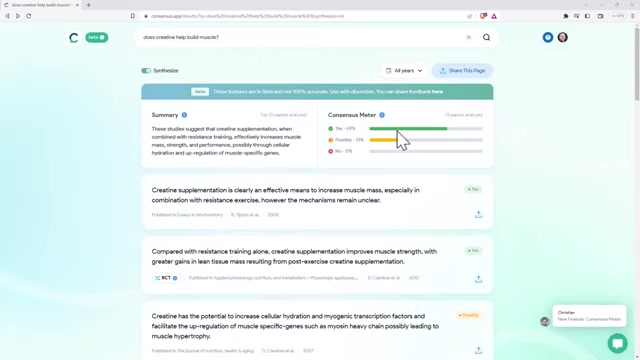
I've tried a few and I found that for some , there's not enough papers that meet the threshold and you'll get a little message here saying it can't find enough research .
It will still list papers and it will still give the little finding summaries , but it doesn't give us the consensus meter if it doesn't think that it has enough different papers to be able to do that .
They have these different warnings , so that saying it's in beta .
They're not 100% accurate .
On the consensus , they give the little caveat saying , they think it's only 90% accurate and I do do like that , but at the end there to not make big life decisions based on this .
But overall , this is a really , really great research tool .
I've been really impressed .
For my second test , I thought I would use one of my own pieces of research .
And so an article that I wrote , a good number of years ago was about the Reynolds Adolescent Depression Scale .
And in particular , whether it was valid for New Zealand adolescents .
And the answer was yes .
Yes , it is .
And so I put in the search here .
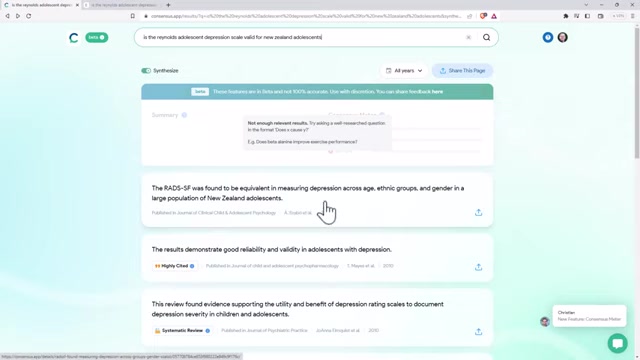
The very first citation they have here , Sabo , is definitely the most relevant , most recent article in this area .
And there's not a ton of them but when we start to scroll down after that , it very quickly starts to flag articles that are not from New Zealand .
And if we jump over to illicit , we can see there's me , that's the top pick there .
They've sorted those first few , I guess , by age .
So we've got my one .
There's the Sabo one , but Milfont is the other .
So these are the 3 that we should have seen and from here , even if we keep scrolling down and loading more , we only see one of the 3 , which is interesting and what that suggests to me is that the number of different research databases and articles that are being covered here , research databases and articles that are being covered here is maybe not quite as thorough as some of the other tools .

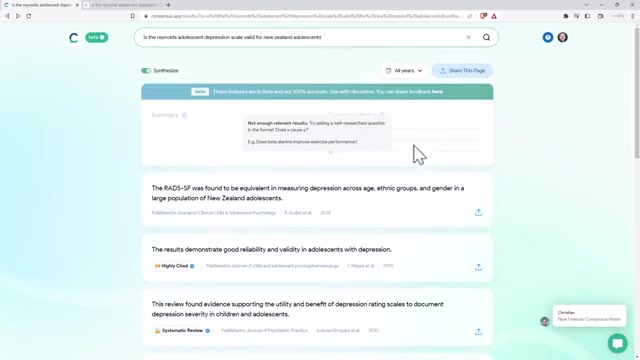
So unless we see a more relevant articles than we did over here .
And hopefully , that's something that will improve over time .
So certainly , that's the the second thing that I think would make consensus better is if they can expand where they are looking .
So this is Consensus , consensustot app .
Just like a lot of these other tools , you can create your account just by linking up your Google account .
And it's pretty good .
It's definitely a nice complement to Elisit and Cyaspace .
And I'm meaning to come back and do another video on illicit .
People said that I didn't really give it a fair go last time .
So that's definitely in the pipeline together with any cool new other research AI tools that might come my way .
Thanks very much for watching and listening .
I will be back soon with more videos on research , statistics , AI , and random stuff .
Are you looking for a way to reach a wider audience and get more views on your videos?
Our innovative video to text transcribing service can help you do just that.
We provide accurate transcriptions of your videos along with visual content that will help you attract new viewers and keep them engaged. Plus, our data analytics and ad campaign tools can help you monetize your content and maximize your revenue.
Let's partner up and take your video content to the next level!
Contact us today to learn more.